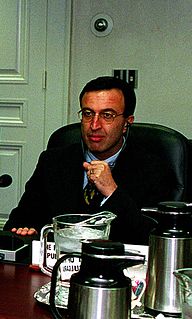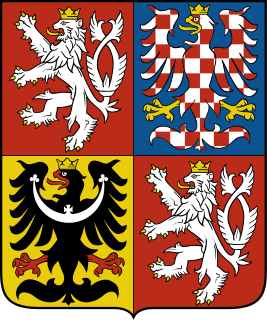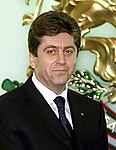
Bulgaria elects on national level a head of state - the president - and a legislature. The president is elected for a five-year term directly by the people. The National Assembly has 240 members, elected for a four-year term by proportional representation in multi-seat constituencies with a 4% threshold. Bulgaria has a multi-party system, in which no one party often has a chance of gaining power alone, and parties must work with each to form governments.
The Democratic Party is a center-right party in Bulgaria led by Alexander Pramatarski. The party is a member of the European People's Party (EPP).

Parliamentary elections were held in Macedonia on 18 October 1998, with a second round on 1 November. VMRO-DPMNE emerged as the largest party, winning 49 of the 120 seats, and later formed a coalition government with Democratic Alternative and the Democratic Party of Albanians.

Parliamentary elections were held in Bulgaria on 19 April 1997. The result was a victory for the United Democratic Forces, which won 137 of the 240 seats. Voter turnout was 62.9%. Following the election, SDS leader Ivan Kostov became Prime Minister.
Constitutional Assembly elections were held in Bulgaria on 10 June 1990, with a second round for eighteen seats on 17 June. They were the first elections held since the fall of Communism the previous winter, and the first free national elections since 1931. The elections were held to elect the 7th Grand National Assembly, tasked with adopting a new (democratic) constitution. The new electoral system was changed from 400 single-member constituencies used during the Communist era to a split system whereby half were elected in single member constituencies and half by proportional representation. The result was a victory for the Bulgarian Socialist Party, the freshly renamed Communist Party, which won 211 of the 400 seats. Voter turnout was 90.3%.

Parliamentary elections were held in Bulgaria on 18 November 1945, the country's first to feature universal suffrage for women. The Bulgarian Agrarian National Union and the Bulgarian Communist Party both won 94 seats. Voter turnout was 84.8%.

Parliamentary elections were held in Bulgaria on 18 November 1923. They followed a coup in June that had overthrown the Bulgarian Agrarian National Union government led by Aleksandar Stamboliyski, which had been elected in April. The result was a victory for the Democratic Alliance, which won 200 of the 247 seats. Voter turnout was 86.2%.

Parliamentary elections were held in Bulgaria between 6 and 27 March 1938, the first after the 1934 coup. The elections were held on a non-partisan basis, with the Bulgarian Agrarian National Union and Bulgarian Communist Party banned. Pro-government candidates won a majority of seats. Voter turnout was 69.5%.

Parliamentary elections were held in Bulgaria on 24 December 1939, although voting continued in some areas into January 1940. The elections were officially held on a non-partisan basis with the Bulgarian Agrarian National Union and Bulgarian Communist Party banned, and in a process tightly controlled by Tsar Boris III, by then the real power in the country. However, candidates representing parties did contest the elections. Pro-government candidates won a majority of seats. Voter turnout was 67.2%.

Direct presidential elections were held for the first time in Bulgaria on 12 January 1992, with a second round on 19 January. The result was a victory for incumbent President Zhelyu Zhelev of the Union of Democratic Forces, who won 52.8% of the vote in the second round. Voter turnout was 75.4% in the first round and 75.9% in the second. Zhelev had originally been elected as President by the Grand National Assembly in 1990.

Presidential elections were held in Bulgaria on 27 October 1996, with a second round on 3 November. The result was a victory for Petar Stoyanov of the United Democratic Forces, who won 59.7% of the vote in the second round. Voter turnout was 63.3% in the first round and 61.8% in the second.

Senate elections for a third of chamber were held in the Czech Republic on 13 and 14 November 1998 with a second round on 20 and 21 November.

Senate elections were held in the Czech Republic on 5 and 6 November 2004, with a second round on 12 and 13 November. The result was a victory for the Civic Democratic Party, which won 37 of the 81 seats. Voter turnout was 28.6% in the first round and just 18.4% in the second.

The 1874 Italian general election was held in Italy on 8 November, with a second round of voting on 15 November. They were a snap election, called by Prime Minister Marco Minghetti to strengthen his majority.

General elections were held in Italy on 29 October 1882, with a second round of voting on 5 November. The "ministerial" left-wing bloc emerged as the largest in Parliament, winning 289 of the 508 seats.

Parliamentary elections were held in the Socialist Republic of Macedonia on 11 November 1990, with a second round on 25 November. They were the first competitive elections in the country's history. VMRO-DPMNE emerged as the largest party, winning 38 of the 120 seats.

The People's Liberal Party was a political party in Bulgaria.

The Liberal Party, also known as the Radoslavists was a political party in Bulgaria from 1887 until 1920.

The United People's Progressive Party was a political party in Bulgaria.

The United Labour Social Democratic Party was a political party in Bulgaria.














